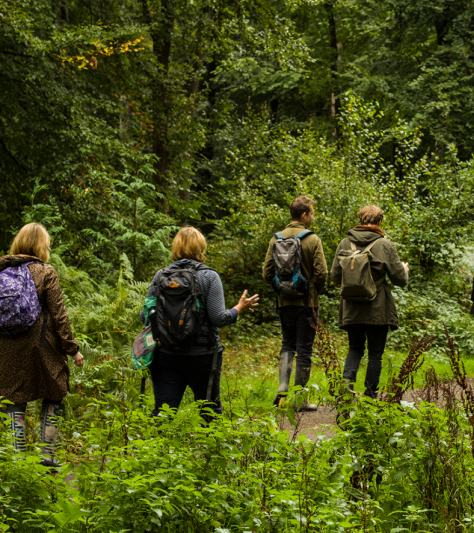Speech and Language: finding our voices in woodland
One of our Education Officers recently ran a session that highlighted another string to the already impressive bow of outdoor learning benefits: an opportunity to focus on speech and language targets.
Ask anyone who is involved in outdoor learning about the benefits and you will get a long and passionate answer: mindfulness, improving dexterity and core strength, gaining an insight into ecosystems, allowing children to work in a way that best suits their learning styles, taking measured risks, standing or sitting in a way they wouldn’t be able to in class. The list goes on! I recently ran a session that highlighted to me another string to the already impressive bow of outdoor learning benefits: an opportunity to focus on speech and language targets.
Scratchy, sticky, leaf, insect. Scratchy, sticky, leaf, insect.
A group of key stage one children were booked for a Teaching Trees session with their speech and language therapist. I was told that most had never travelled far from their urban neighbourhood before so there were some mixed feelings about being on a minibus for 40 minutes and going into the woods. As soon as they arrived we did some settling activities to really become present in our new ‘classroom’. We excitedly counted the sheep in the paddock by the woodland entrance and stopped and listened silently to the new sounds surrounding us. The children recreated some of the sounds and before we knew it we had a woodland orchestra complete with ‘breeze in the leaves’, ‘songbird’ and ‘creaking branch’ sections! With our voices warmed up we continued deeper into the woodlands.
Next, a hunt for woodland treasures to fill their own little treasure boxes (based on their individual speech and language targets like a ‘slimy slug’ or a ‘scratchy leaf’). Then, a challenge to re-build a miniature town using timber from the woods complete with ‘hospital’ and ‘bus stop’. Finally, a search for the rainbow finding that the woodland was far more than just brown and green.
As we settled down under the trees for our picnic lunch, it was so nice to hear all the children chatting about what they had done and what they had in their lunchboxes.
The school plans to bring these children out to the woods every season over the year to continue to build their speech and language practise and learn about the woodland.
The owners of this particular woodland, who very kindly give permission for us to run Teaching Trees sessions, said:
“We have lived in our small woodland for 40 years, where we, our children and grandchildren have had fun. So we have been delighted to welcome children from the city to experience woodland for themselves. We have been pleased that they have enjoyed it, leaving it tidy and look forward to seeing them again soon”
Peter and Tessa
Georgia Spooner
Georgia Spooner is our Teaching Trees Officer in Gloucestershire.
In this blog she describes a visit with a speech and language focus which turned out to be one of the highlights of the year for all involved.
The organising therapist said: "The students still talk about it now many weeks later. This kind of trip is much more than just a day in the forest, it gave them an invaluable opportunity to learn through real life experience rather than from films or books."
RFS Teaching Trees works with primary schools and landowners, offering educational visits to local woodlands.
Our curriculum linked sessions give children the opportunity to learn about trees, wildlife and forestry in a fun and hands-on way.

